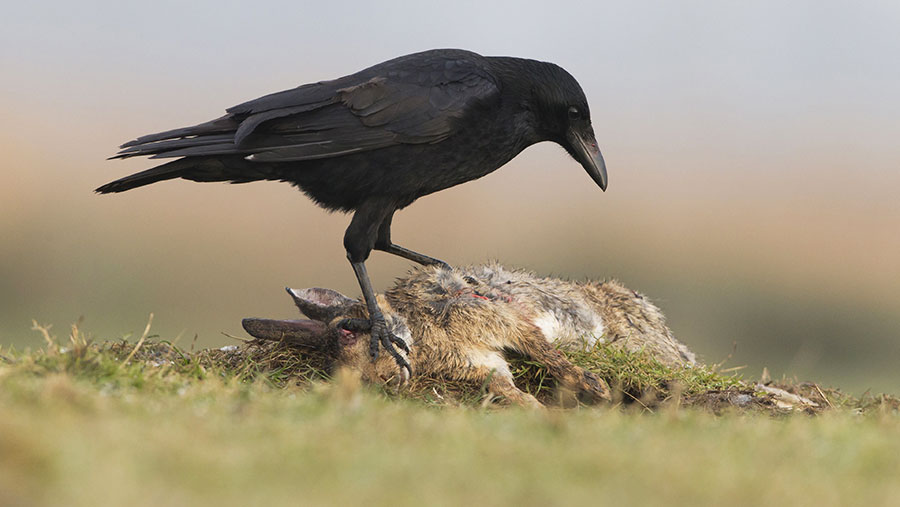Wild Justice prepares fresh attack on Welsh shooting licences
 © FLPA/Shutterstock
© FLPA/Shutterstock Conservation group Wild Justice is preparing a legal challenge to the general licences issued by Natural Resources Wales (NRW), which sanction the shooting of pest bird species in Wales.
The organisation, set up last year by naturalist Chris Packham and ex-RSPB director Mark Avery to challenge licences in England, has written a “pre-action protocol letter” to NRW, setting out its intention to seek a judicial review.
See also: A guide to effective bird scaring kits for farmers
“Wild Justice’s main interest is in the general licence which applies to lethal control of birds for so-called conservation purposes,” it said.
“But since the legal flaws we have identified apply to all the general licences issued by NRW, there is little point in trying to differentiate between them. The farming industry should reflect on that.”
‘Flawed’
Wild Justice says that revised general licences, issued by NRW in November 2019 and rolled over into 2020, are “fatally and irredeemably flawed”.
According to Mr Avery, the licences, which cover the shooting of certain birds to protect farmers’ crops and livestock, as well as for conservation purposes, are too loosely worded.
“Natural Resources Wales does not properly specify the conditions under which the general licences may apply, or what people need to do in terms of trying other non-lethal methods before resorting to shooting,” he told Farmers Weekly.
Wild Justice is therefore demanding NRW revokes the current general licence, giving it until 17 February to respond, or face judicial review proceedings.
“The sheer degree of killing of wild birds that the unlawful licences may permit over the 12-month period requires that the flaws in those licences must be promptly addressed,” said the pre-action protocol letter.
Chaos in the countryside
But the British Association for Shooting and Conservation (BASC) accused Wild Justice of trying to “close down the Welsh countryside” with its legal challenge.
“A similar move in England last year caused chaos in the countryside and led to significant economic and environmental damage,” it said.
Steve Griffiths, BASC’s director for Wales, said the planned legal action was a direct threat to farmers, conservationists and pest control businesses at a vital time of year.
“Wild Justice’s ‘lawfare’ tactics aim to wrap the farming and shooting communities up in so much red tape that everyday actions become impossible,” he said.
‘Agressive’
James Legge, head of politics at the Countryside Alliance, urged NRW to “stand up to aggressive and threatening tactics deployed by Wild Justice”.
“The interpretation of the law proposed by Wild Justice would mean that, in practice, general licences could rarely, if ever, be issued,” he said.
“This is clearly contrary to the intention of the Birds Directive, which recognises the need to be able to protect farming, public health and conservation interests, including vulnerable bird species.”
An NRW spokesperson said the organisation had already committed to reviewing its approach to wild bird control licencing in 2020. “As this is now part of a legal process, we cannot comment further at this time.”
Which four NRW general licences are in question?
- GL001 Licence to kill or take certain wild birds to prevent serious damage to livestock, foodstuffs for livestock, crops, vegetables or fruit, or to prevent the spread of disease to livestock, foodstuffs for livestock, crops, vegetables or fruit. Species covered: carrion crow, magpie, jackdaw, feral pigeon, woodpigeon, Canadian goose.
- GL002 Licence to kill or take certain wild birds for the purpose of preserving public health and preventing the spread of disease to humans. Species covered: feral pigeon
- GL004 Licence to kill or take certain wild birds for the purpose of conserving wild birds. Species covered: carrion crow, magpie, jackdaw, jay
- GL016 Licence to take and release alive certain wild birds from food premises for the purpose of preserving public health and public safety. Species covered: blackbird, dunnock, robin, house sparrow, starling, song thrush, blue tit, great tit, pied wagtail
